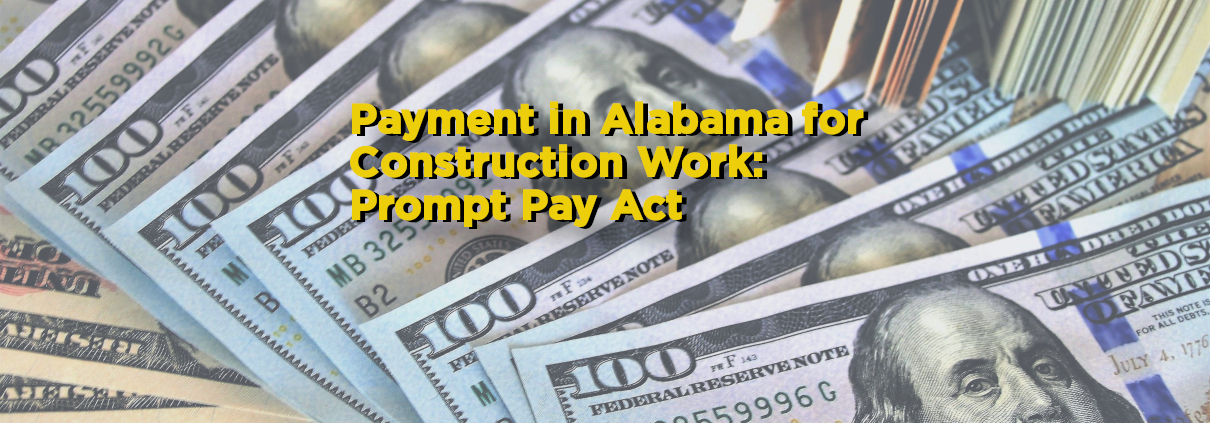By Oscar M. Price, III and Larry S. Logsdon
Like most states, Alabama has enacted legislation specifically addressing payment for construction work. Alabama has separate legislation for private work and public work. Federal legislation controls payment for construction work for the United States governmental and its agencies. The following is a brief summary of Alabama law. It is intended as an overview. For specific applications and questions, refer to the actual legislation or contact your attorney. The Associated Builders and contractors of Alabama and the American Institute of Architects – Birmingham Chapter have jointly prepared suggested pay guidelines which are consistent with Alabama law. A copy of these Pay Guidelines follows the summary of Alabama law.
Private Works
The Alabama Prompt Pay Act (Ala. Code 1975 §8-29-1 thru 8) addresses payment to contractors, subcontractors and sub-subcontractors on private work in Alabama (“The Private Prompt Pay Act”). The Private Prompt Pay Act broadly applies to contracts with an owner to improve real property or perform construction services for an owner. The Private Prompt Pay Act does not apply to 1) residential home builders; 2) buildings intended for residential purposes which consist of 16 or fewer units; 3) contracts or subcontracts in the amount of ten thousand dollars ($10,000) or less; and 4) contracts with state or local governments. (See Public Works) The Private Prompt Pay Act specifically states that performance by the contractor or subcontractor in accordance with his or her contract entitles them to payment. It also addresses the requirements for timely payments to contractors, subcontractors and sub-subcontractors.
Contractors
When a contractor has performed in accordance with his or her contract and submits an application or pay request to the owner, the owner shall pay the contractor according to the payment terms agreed to between the owner and the contractor. The agreed upon payment terms are to be specified in the contract documents. If the payment terms are not agreed to then payment shall be made to the contractor within thirty (30) days after receipt of the pay request or invoice.
Subcontractor
When a subcontractor has performed in accordance with his or her subcontract and submits an application or pay request to the contractor in sufficient time to allow the contractor to include the application or request in the contractor’s own pay request to the owner, the contractor shall pay the subcontractor according to the payment terms agreed to between the contractor and subcontractor. If the payment terms are not agreed to, then payment shall be made to the subcontractor within seven (7) days of the contractor’s receipt of payment from the owner.
Sub-subcontractor
When a sub-subcontractor has performed in accordance with his or her sub-subcontract and submits an application or pay request to the subcontractor in sufficient time to allow the subcontractor to include the application or pay request in the subcontractor’s own pay request submitted to the contractor, the subcontractor shall pay the sub-subcontractor according to the payment terms agreed to between the subcontractor and sub-subcontractor. If the payment terms are not agreed to, then the subcontractor shall pay the sub-subcontractor within seven (7) days of receipt of payment from the contractor.
Interest and Attorney’s Fees
If an owner, contractor or subcontractor does not make payment as required by The Prompt Pay Act, the owner, contractor or subcontractor shall be obligated to pay interest at the rate of one percent (1%) per month on the unpaid balance due. In addition, if a contractor, subcontractor or sub-subcontractor prevails in court to recover payment under the Prompt Pay Act, the prevailing party is entitled to recover reasonable attorney’s fees, court costs and reasonable expenses.
Pay When Paid, Retainage
The Prompt Pay Act requires that a contractor who receives payment from an owner must pay each of its subcontractors the portion of the owner’s payment corresponding to that subcontractor’s interest in the owner’s payment. It further provides that the percentage of retainage withheld on payments from the contractor to its subcontractors shall not be greater than the percentage of retainage withheld on payments from the owner to the contractor. The same requirement is imposed upon retainage by subcontractors on sub-subcontractors.
Right to Withhold Payment
The Prompt Pay Act allows an owner, contractor or subcontractor to withhold payment for certain specified reasons. The owner, contractor or subcontractor may withhold payment for one or more of the following reasons:
- Unsatisfactory job progress;
- Defective construction not remedied;
- Disputed work;
- Third party claims filed or reasonable evidence a claim will be filed;
- Failure of the contractor, subcontractor or sub-subcontractor to make timely payments for labor, equipment or materials;
- Property damage to the owner, contractor or subcontractor; and/or
- Reasonable evidence that the contract, subcontract or sub-subcontract cannot be completed for the unpaid balance of the contract.
Notice of Disputed Payment Request. The Prompt Pay Act requires an owner to notify a contractor in writing within fifteen (15) days of receipt of a request for payment which it disputes. A contractor, subcontractor or sub-subcontractor must give written notice within five (5) days of receipt of a disputed request for payment. If there is a bonafide dispute over all or any portion of an amount due, then the owner, contractor or subcontractor may withhold payment in an amount not to exceed two times the disputed amount.
Mechanic’s Lien. The Alabama Prompt Pay Act is separate from the Alabama legislation that governs mechanic’s liens. A mechanic’s lien is a separate right governed by a different Alabama statute.
State of Alabama as a Party
Alabama Code section 41-16-3 contains separate prompt pay provision that apply “[w]henever the State of Alabama is a party to any contract.” (the “State Act”). The time limitations in the State Act are very similar to those in the Private Prompt Pay Act discussed above. The required payment terms are as follows.
Owner to Contractor
Payment to contractor must be made in 30 days from completion of work and presentation of a proper invoice. There is nothing in the statute about a contractual provision stating a different time for payment.
Contractor to Subcontractor
Payment to subcontractor must be made in 7 days from payment by the state; however, that 7 day rule applies unless contract states otherwise.
Pay When Paid, Retainage
Like the Private Prompt Pay Act, the amount of retainage cannot exceed the amount that is being withheld by the state. That is, if the state is holding 5% retainage from a contractor, the contractor can only hold 5% retainage from a subcontractor. If retainage is held in excess of what is being held by the state then interest accrues on the amount of the retainage. There is no provision in the statute allowing for the terms of the contract to state otherwise.
Right to Withhold Payment and Disputing Pay Request
Also, like the Private Prompt Pay Act, a pay request can be disputed for the same reasons that are listed above for the private act. Additionally, the State Act, like the Private Act gives the state 15 days a contractor or subcontractor 5 days from the date of a pay request to dispute the request if it is done in writing.
Interest and Attorneys’ Fees
Unlike the Private Act there is no attorneys’ fees provision. Additionally, interest accrues for late payment but unlike the Private Act which sets the rate at 1% per month, there is no specific interest rate in the State Act. Additionally, unlike the Private Act, there is no attorneys’ fees provision.
Public Works
Alabama has separate legislation governing public works (Code of Ala. §39-2-1 thru 14). Public works is the construction, repair or renovation of public buildings, structures, water works, roads, bridges, docks, and any other improvement on public property. Public property is property owned by the state, county, or municipality, or any board, commission, agency, authority or subdivision of the state, a county or municipality. Part of that legislation deals specifically with partial and final payments to contractors by the public authority for Public Works. It does not address payments to subcontractors or sub-subcontractors; however, it does require that contractors on public works (except when the contract is less than $80,000) obtain a payment bond for the protection of subcontractors and suppliers.
Partial Payments
The Public Works legislation only requires that “unless otherwise provided in the specifications, partial payments shall be made as the work progresses at the end of each calendar month, or as soon thereafter as is practicable, on the estimates made and approved by the awarding authority” [emphasis added]. It further provides that material delivered on site, material suitably stored and insured off-site and preparatory work done may be taken into consideration in the partial payments. The Public Works Act does not prevent the Public Authority from changing the partial payment provision in the specifications and does not define “as soon thereafter as is practicable.”
Retainage
The Public Works Act requires that there not be retained more than five percent (5%) of the estimated amount of the work done; and after fifty percent (50%) completion has been accomplished, no further retainage shall be withheld. It also provides a mechanism for using an escrow account or depositing security in lieu of retainage. Unlike partial payments, there is nothing in the Public Works Act that allows the Public Authority to change these provisions.
Final Payment
An amendment to the Public Works Act was recently passed that addressed the timing of final payment. The Public Works Act now requires that upon the contractor’s completion and the awarding authority’s acceptance of all work and upon the contractor’s providing: (1) a properly executed and duly certified voucher for payment; (2) a release; and (3) proof of the required advertisement, the awarding authority shall pay the contractor the amount due. The legislation further specifies that payment shall become due forty (40) days after these requirements are met. If the awarding authority fails to make the payment as required, interest shall be due and owing to the contractor. The interest rate shall be the rate currently charged by the Alabama Department of Revenue. Unlike partial payments, the Public Works Act makes final payment mandatory forty (40) days after the requirements are met.
Oscar M. Price, III is a partner with the law firm of Wallace, Jordan, Ratliff & Brandt, L.L.C. in Birmingham, Alabama. He specializes in construction and general business law. He is a member of the Alabama State Bar, the ABA and the Forum on the Construction Industry. He has served an officer and director of the Associated Builders and Contractors of Alabama. He is a former member of the Board of Directors of the National Roofing Contractor’s Association. For several years he served as president of a large speciality contractor in Alabama.
Larry S. Logsdon is also as a partner with the law firm of Wallace, Jordan, Ratliff & Brandt, L.L.C. Mr. Logsdon practices in general commercial litigation and also represents contractors, subcontractors, owners and suppliers involved in all aspects of the construction industry. Mr. Logsdon is co-author of “Alabama Construction Law: What do you do when …?” (National Business Institute, Inc. May 2003 and 2004). Mr. Logsdon also presented the national Business Institute’s seminar entitled “Mechanic’s Lien Law and Strategies in Alabama.” He is a member of the Alabama State Bar, an associate member of Association of General Contractors and an associate member of the American Subcontractors Association.


